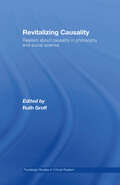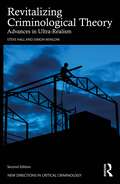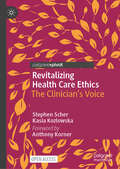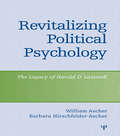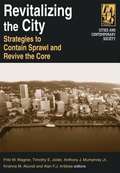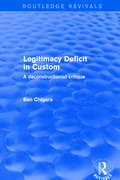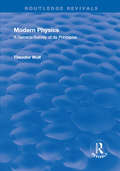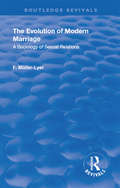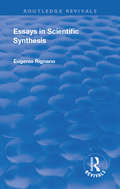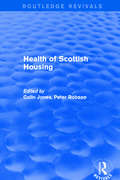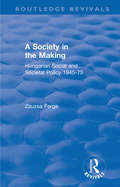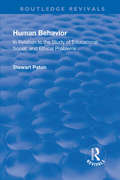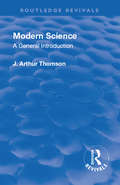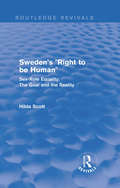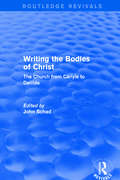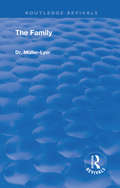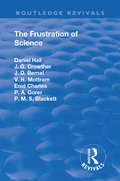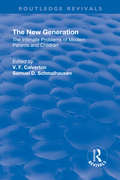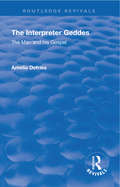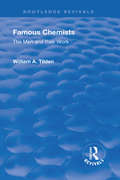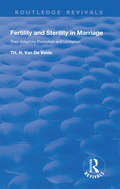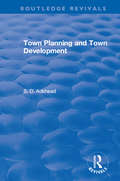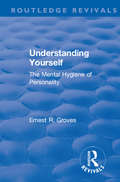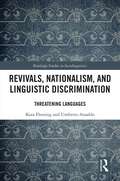- Table View
- List View
Revitalizing Causality: Realism about Causality in Philosophy and Social Science (Routledge Studies in Critical Realism)
by Ruth GroffThis cutting edge collection of new and previously published articles by philosophers and social scientists addresses just what it means to invoke causal mechanisms, or powers, in the context of offering a causal explanation. A unique collection, it offers the reader various disciplinary and inter-disciplinary divides, helping to stake out a new, neo-Aristotelian position within contemporary debate.
Revitalizing Criminological Theory: Advances in Ultra-Realism (New Directions in Critical Criminology)
by Steve Hall Simon WinlowThe second edition of Revitalizing Criminological Theory is a substantial revision and expansion of the first edition. Ultra-realism is a unique school of criminological thought currently establishing itself in the discipline despite resistance from traditional schools. The second edition still provides the undergraduate and postgraduate student reader with an invaluable guide to existing schools of thought and their roots in politics and philosophy, but with updated commentary on their intellectual flaws.In the first edition, Hall and Winlow introduced a number of important new concepts that laid the foundations for an alternative theoretical framework and research programme in criminology. In three additional chapters written specially for this edition, they introduce further concepts and substantive revisions to the theoretical framework. They also outline and discuss in detail the growing body of award-winning criminological projects conducted by a new generation of researchers who have adopted and mobilised ultra-realist thinking over the past ten years. During this period of time, ultra-realism has also made significant progress towards its primary objectives of understanding human motivations, constructing insightful representations of reality and answering the fundamental zemiological question of why some human beings risk inflicting harm on others to further their own interests or achieve various ends. The philosophical and psychosocial approaches outlined in the first edition are now significantly advanced and able to offer a more detailed answer to this question and a convincing alternative to the traditional paradigms of conservatism, neoclassicism and left liberalism. Ultra-realism is now in a position to make some substantive contributions to the debate on the depth of political intervention required to get serious about reducing the impact of crime and harm on the lives of ordinary people.This book is essential reading for academics and students engaged in the study of criminology, sociology, social psychology, the philosophy of social science and the history of crime.
Revitalizing Health Care Ethics: The Clinician’s Voice
by Stephen Scher Kasia KozlowskaThis open access book explores the origins and development of the clinician’s moral voice and how that voice is embedded in the informal ethical discourse of everyday health care. This moral voice, developed over the course of a lifetime—including through professional education and practice—enables clinicians to understand and address the ethical issues that arise in their everyday work with patients, families, and colleagues. The early chapters explain how health care students move from outsiders to insiders—members of the distinct moral and professional communities that define each particular field of health care. The book describes how students, trainees, and clinicians draw on and extend their own existing intellectual, emotional, and moral capacities, and how they use these capacities to address the daily challenges, ethical and otherwise, that arise in the clinic. This approach is designed both to empower clinicians and to inform bioethicists and others in their attempts to work more effectively within clinical settings. This book is available open access under a CC BY-NC-ND 4.0 license.
Revitalizing Minority Languages: New Speakers of Breton, Yiddish and Lemko (Palgrave Studies in Minority Languages and Communities)
by Michael HornsbyNew speakers are an increasingly important aspect of the revitalization of minority languages since, in some cases, they can make up the majority of the language community in question. This volume examines this phenomenon from the viewpoint of three minority languages: Breton, Yiddish and Lemko.
Revitalizing Political Psychology: The Legacy of Harold D. Lasswell
by William Ascher Barbara Hirschfelder-AscherThe goal of this book is to recapture the diminished roles of affect, psychological needs, and the psychodynamic mechanisms that are crucial for understanding political behavior by explaining and extending the contributions of Harold D. Lasswell, the dominant figure in political psychology in the mid-twentieth-century. Although Lasswell was best known for applying psychodynamic theories to politics, this book also demonstrates how his framework accommodated for cognitive processes and social interactions ranging from communications to policy-making. The authors use Lasswell's contributions and the debates over his ideas as a springboard for examining current policy, political, and leadership issues.Revitalizing Political Psychology presents and extends four aspects of Lasswell's contributions to the field: the psychodynamic mechanisms drawn from psychoanalytic theory, the use of symbol associations to understand political propaganda, the analysis of "democratic character" for both the public and the elites, and the structure of belief systems. In so doing, the authors link personality and political communication theory to democratic practice. The authors also critique leadership studies using Lasswell's concerns over the risks to democratic accountability and the current preoccupation with strengthening the roles of charismatic and transformational leaders.Intended for researchers, practitioners, and students in the areas of political and historical psychology, political strategy, and political communication, the book's emphasis on psychodynamics also appeals to psychoanalysts and the material on leadership appeals to professionals in management and industrial/organizational psychology.
Revitalizing the City: Strategies to Contain Sprawl and Revive the Core
by Fritz W. Wagner Timothy E. Joder Alan F. J. Artibise Krishna M. Akundi Anthony J. Mumphrey Jr.In this unique collaboration between Canadian and US researchers, contributors of 13 articles describe their work in such issues as urban sprawl, metropolitan governance, central city revitalization, and city-suburb cooperation. The articles define key issues, describe their research and experience in local initiatives, identify effective policies and programs, and also warn of potential pitfalls. Articles on urban growth include studies on suburban expansion and metropolitan development, the need to contain growth, and the experience of San Diego. Those on metropolitan administration include case studies of Vancouver and St. Louis and a preliminary assessment of regional "smart growth. " Those on redevelopment include a study of the impact of building code enforcement, citizen reactions to brownfield development, and the effectiveness of the payments-in- lieu-of taxes strategy. Articles on suburban connections include studies of policy choices, mixed-income housing and "cybercitY" development. Annotation ©2004 Book News, Inc. , Portland, OR (booknews. com)
Revival (2001): Towards a Deconstructionist Theory
by Ben ChiagraThis title was first published in 2001. A discussion of customary international law (CIL). Throughout the study particular values are examined for their potential effect on the legitimacy of the process of custom. The writer argues that, in order to achieve legitimacy enhancing transparency in the process of custom, it must be acknowledged first that the power applied by international tribunals when they inaugurate new norms of customary international law always creates categories of "dominance" and "subservience", "inclusion" and "exclusion". Such an acknowledgement would foster a situation where both the power applied by tribunals and the manner in which it is applied, can legally be scrutinized for excesses that limit first the transparency of the process of custom, and second the legitimacy of norms of customary international law.
Revival: A General Survey of its Principles (Routledge Revivals)
by Theodor WulfIn the present book those results of physical research which are of importance for an understanding of nature have been compiled in a short and, in so far as the author was capable, popular presentation. The whole can be arranged in four sections. The first section concerns bodies as they appear to us and as we perceive them directly by means of our eyes. By further research we have learnt that these bodies are built out of very small particles which we call atoms. Even though these atoms cannot be seen directly with the eye, yet we still have quite certain proofs of their existence and of many of their properties. The whole of our knowledge concerning the atomic structure of matter has been discussed in the second section. The work of the last few decades has allowed us to penetrate still further into the inner structure of matter. The structure of the atom itself is examined in the third section. Finally, there exists a whole series of phenomena, which have been explained on the assumption that, in addition to ponderable matters, there is something still else which fills all interstellar space, a medium which is called the aether. The phenomena which take place in this medium are discussed in the last section of the book.
Revival: A Sociology of Sexual Relations (Routledge Revivals)
by Franz Carl Muller-LyerSo many books on marriage leave one with a feeling of chaos that it is important to examine any document underlying the discovery of order by searching for underlying tendencies. The author emphasizes the necessity of taking the evolutionary point of view, and sees in militant feminism, which teaches emulation of men, a phase which will pass as women come to make their own peculiar spiritual contribution to civilization as men have done. Perhaps this will come the sooner, he suggests, if women will regard themselves as the equivalents and not as the equals of men.
Revival: Essays in Scientific Synthesis (Routledge Revivals)
by Eugenio RignanoAlthough each of the essays in this volume is a study complete in itself, they are connected by one and the same synthetic spirit, and are animated by one and the same object: that of demonstrating the utility in the biological, psychological, and sociological fields of the theorist, who, without having specialized in any particular branch or subdivision of science, may nevertheless bring into those spheres that synthetic and unifying vision which is brought by the theorist mathematician, with so much success, into the physico-chemical field of science.
Revival: Health of Scottish Housing (2001)
by Peter Robson Colin JonesThis title was first published in 2001. Inspired by the thirtieth anniversary of Shelter Scotland, this volume provides an overview of Scottish housing policies and legislation, looks back at the changes to major tenures, eviction policies and homelessness over the past thirty years and explores the potential of the new Scottish Parliament to bring about change in this important social, political and economic arena.
Revival: Hungarian Social and Societal Policy, 1945-75 (Routledge Revivals)
by Zsuzsa FergeThis title was first published in 1979.
Revival: In Relation to the Study of Educational, Social & Ethical Problems (Routledge Revivals)
by Stewart PatonThis book is intended to serve as an introduction to the study of human behivor. The author has therefore attempted to present a brief outline in a form favorable for discussion and investigation. The importance of the subject is obvious and has been tragically emphasized by the present world crisis. Little is known about man as he is. Imagination has supplied many of the details in the picture of what he was once supposed to be, while disappointment associated with unrealized expectations of what he might have become has increased the difficulties of taking measure of his present stature. Parent, teacher, physician, student of social phenomena, prospective reformer, statesman and philosopher, each has his special interest in the general human problem. To-day every intelligent citizen is anxiously awaiting the solution to the problem of how "democracy may be made safe for the world". There can be little doubt that in the careful, painstaking study of man as he is will be found the means by which human institutions may be established upon a more rational basis and at least an intelligent effort made to lay the foundations of a durable peace.
Revival: Modern Science (Routledge Revivals)
by J. Arthur ThomsonThe aim of this book is to give a general idea of the way in which Modern Science looks out on the world. By selecting a few salient illustrations, it seeks to show how the various sciences are disclosing the Order of Nature. It is hoped that it may be of service to the able minded reader who wishes an introduction of an informal type to the chief scientific problems of today. The book is meant to be suggestive as well as informative; and two characteristic features may be noted, for they are deliberate: the illustrations of scientific progress that have been selected are taken from all the great orders of facts – from astronomy to anthropology; and they deal not with easy things, but with the big problems that matter most.
Revival: Sweden's Right to be Human (Routledge Revivals)
by Hilda ScottThis title was first published in 1982. In this book the author’s main purpose has been to follow the genesis, the effects, and the side effects of the measures to achieve sex-role equality that have been taken, and to identify the obstacles that have prevented them from being fully effective. During her three vists to Sweden and from inteviews she seeks to record the feedback of these events on the sex-role equality drive and on the attitudes of women particularly. In conclusion she has ventured to predict in a very general way the direction that work for equality will take in the future.
Revival: The Church from Carlyle to Derrida (Routledge Revivals)
by John SchadThis title was first published in 2001. A volume of essays on the Pauline, ecclesiastical body of Christ -the church. It is, of course, not possible to separate completely one body of Christ from another, and the essays do not make the attempt. The dark, institutional history of the church is a running theme, a running sore, throughout the volume; in that sense the essays respond to Michel Foucault's insistence that we should be mindful of the institutions that surreptitiously inform our discourse and culture. The essays deal with the myriad of ways in which the church is named, spoken and, above all, written in the age of secularization. In this sense, the contributors are simply exploring the relationship between the church and modern writing.
Revival: The Family (Routledge Revivals)
by Franz Carl Muller-LyerThis book is a sociological study of the institution of marriage in all its possible forms and a discussion of family and of kinship. What were marriage and the family in the "dim red dawn of man"? How have they changed and evolved? What is their probable future? This clear and comprehensive book, written by a leading sociologist, answers these questions with a wealth of material, from a thoroughly modern point of view, and without traditional prejudices.
Revival: The Frustration of Science (Routledge Revivals)
by Alfred Daniel, HallFrom the beginning to the end of these pages, whether we read of the wilful destruction of the products and productivity of the soil, the aerial destruction of wealth by the thousand million pounds’ worth, created by somebody’s labour, the embarrassing fecundity of modern technology resulting only in every conceivable form of sabotage, the anomalous position of the conscientious medical practitioner. The refusal of women to bring children into such a world, the development of the art of spreading bacterial infection as a new war technique, or the frank abandonment by modern political movements of the hope of social progress that science renders possible – from the beginning to the end of these pages the reader will find elegant examples of the sort of ruling mentality now dominating the world. Bitter, and justifiably so, as many of the critics of science are, surely nothing bitterer could be said of it than this, that its abundance has but enthroned the wastrel. Not is the solution exactly what one of the contributors rather naively suggests, that science should look for a new master. The solution is for the public to acknowledge its real master, and, for its own safety, insist on being ruled not by the reflection of a reflection, but direct by those who are concerned with the creation of its weather rather than of its debts. It should require that its universities and learned societies should no longer evade their responsibilities and hide under the guise of false humility as the hired servants of the world their work has made possible, but do that for which they are supposed in cultured release from routine occupations, and speak the truth though the heavens fall.
Revival: The Intimate Problems of Modern Parents and Children (Routledge Revivals)
by V. F. Calverton, Samuel D. SchmalhausenThis is the second presentation by these editors of a collection of essays dealing with the changing point of view relative to morals, particularly as they affect the marital state. The contributions to this volume include all of those names that have become prominent in the field of psychology and sociology. The one question that arises in the mind of the critic is whether or not it is wise to distribute for general reading to a popular audience such discussions of sex perversion as this volume makes available. The essays are all of interest, although many of the authors are unnecessarily verbose.
Revival: The Man and His Gospel (Routledge Revivals)
by Amelia DefriesFrom Book’s Foreward What so strongly attracted me in Patrick Geddes when I came to know him in India was, not his scientific achievements, but, on the contrary, the rare fact of the fullness of his personality rising far above his science. Whatever subjects he has studies and mastered have become vitally one with his humanity. He has the precision of the scientist and the vision of the prophet; and at the same time, the power of the artist to make his ideas visible through the language of symbols. His love of Man has given him the insight to see the truth of Man, and his imagination to realize in the world the infinite mystery of life and not merely its mechanical aspect.
Revival: The Men and Their Work (Routledge Revivals)
by William A., TildenThe present volume is an attempt to skitch, in a style suitable for general reading, the lives of some of the most prominent chemists of the past. As it is obviously impossible for one person to deal with them all, the first great difficulty in such a project is to make the selection. After much reflection, the guiding principle adopted is the evolution of the Atomic Theory from the point of view of the Chemist.
Revival: Their Voluntary Promotion and Limitation (Routledge Revivals)
by Theodoor Hendrik van de VeldeIn this work the eminent Dutch physician offers for the intelligent layman as well as for doctors, psychologists, teachers and social workers a guide to the causes and effects of fertility and sterility. This book is the third and last volume in Dr Theodoor Hendrik van de Velde’s trilogy on the problems of marriage and this book completes his internationally authoritative work on eugenics and volitional sex behavior. Following his other book Ideal Marriage and Sexual Tensions in Marriage, this book considers such problems as sexual abstinence and excess, family limitation, the achievement of desired pregnancy, the causes and consequences, physically and emotionally, and sterility in women and impotence in men, artificial insemination, and the delicate personal and social aspects of undesired conception. Scientific in its approach and simple in its presentation, this book is for doctors and laymen. It offers information that contributes to a healthier understanding of voluntary and planned conception and helps safeguard happiness in marriage.
Revival: Town Planning and Town Development (Routledge Revivals)
by S. D. AdsheadSince the passing of the Housing, Town Planning, etc, Act, 1909, there have been published a considerable number of books and a vast number of pamphlets and magazine articles dealing with the subject of Town Planning. There has, however, been produced nothing that can be described as a text-book for the student." A detailed study, including the sociological basis of town planning, traffic requirments & roads, zoning, town planning, municipal planning, and early housing acts, later acts, and more."
Revival: Understanding Yourself: The Mental Hygiene Of Personality (1935) (Routledge Revivals)
by Ernest R. GrovesThis book has a practical purpose. It seeks to help the reader to understand himself and his problems, that he may increase his successes, his fruit, and his satisfactions. The discussion centers about the conditions that shape personality, but the attempt of the book is not to rehearse the findings and theories of science but to provide the means by which the reader can come to a better understanding of himself.
Revivals, Nationalism, and Linguistic Discrimination: Threatening Languages (Routledge Studies in Sociolinguistics)
by Umberto Ansaldo Kara FlemingIs linguistic revival beneficiary to the plight of newly emerging, peripheral or even ‘threatened’ cultures? Or is it a smokescreen that hides the vestiges of ethnocentric ideologies, which ultimately create a hegemonic relationship? This book takes a critical look at revival exercises of special historical and geopolitical significance, and argues that a critical and cautious approach to revival movements is necessary. The cases of Sinhala, Kazakh, Mongolian, Catalan, and even Hong Kong Cantonese show that it is not through linguistic revival, but rather through political representation and economic development, that the peoples in question achieve competitiveness and equality amongst their neighbors. On the other hand, linguistic revival in these and other contexts can, and has been, used to support nationalist or ethnocentric agendas, to the detriment of other groups, recreating the same dynamics that generated the argument for revival in the first place. This book argues that respect for linguistic and other diversity, multilingualism and multiculturalism, is not compatible with linguistic revival that mirrors nation-building and essentializing identity construction.
